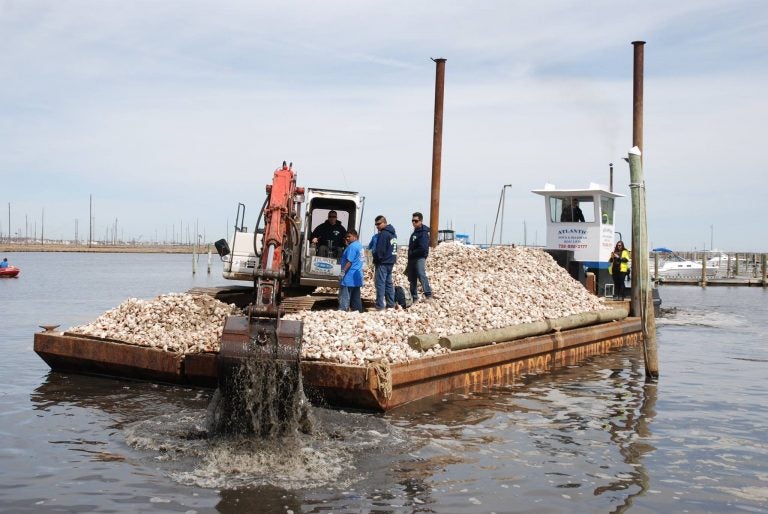Barnegat Bay advocates hope whelk shell project spurs oyster colony restoration

Whelk shells are deposited into the Barnegat Bay Thursday. (Photo courtesy of Congressman Tom MacArthur)
If all goes to plan, an oyster colony will thrive in the Barnegat Bay off Good Luck Point in Bayville, experts say.
Thousands of whelk shells were added Thursday to over a half-acre of Barnegat Bay bottom near an historic oyster habitat.
An ongoing effort to restore important habitats in the bay, the project introduces new innovations intended to increase its success in reviving the oyster population, according to the American Littoral Society.
“The bay bottom here is firm but the oysters need ‘real-estate.’ Research last year showed that salinity conditions could be ideal at Good Luck Point and if we do get a set, we hope the whelk will deter predation by cow-nosed rays who like to feed on oysters,” says Captain Alek Modjeski, Habitat Restoration Director of the American Littoral Society.
The experiment is part of a larger mission to restore the health of the Barnegat Bay, says Helen Henderson, Atlantic Coast Program Manager for the American Littoral Society.
“We seek a holistic approach to bringing the bay back to health. We have a petition that we are asking the public that love and enjoy the bay to sign so we can also ‘protect the land to protect the bay,” she says. “This would require that the state take action and declare Barnegat Bay ‘impaired’ and the implement a measured reduction in the amount of polluted stormwater runoff entering the bay under the federal clean water act.”
The Good Luck Point area is historically known to have possessed one of the most prolific and extensive oyster beds in the region.
According to some local Barnegat baymen, visitors traveling from points north in the late 19th and early 20th century were known to jump from the train to pick oysters directly off the reef and bring them to their summer homes to cook for dinner.
WHYY is your source for fact-based, in-depth journalism and information. As a nonprofit organization, we rely on financial support from readers like you. Please give today.

